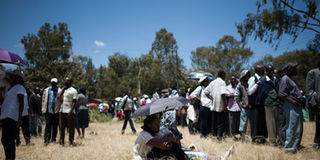Prepare for the Kenya polls

A Kenyan lady sits under an umbrella as voters queue to cast their ballot in Karen, a district of the Kenyan capital Nairobi, on March 4, 2013 during the nationwide elections. Long lines of Kenyans queued from way before dawn to vote Monday in the first election since the violence-wracked polls five years ago, with a deadly police ambush hours before polling started marring the key ballot. AFP photo
What you need to know:
- For the record, we do not predict violence or trouble after the elections but history suggests we should prepared to avoid lamentations. The 2007 post-election violence in Kenya resulted in the destruction of the railway line and paralyzed business for weeks. President Museveni has given his stance on the elections in Kenya and, hopefully, this will ease concerns that his government was siding with a particular candidate against another.
The election season in Kenya is in high gear with aspirants building coalitions to bolster their chances of winning. Kenyans will go to the polls on August 9 to pick their 5th President since Independence as the incumbent Uhuru Kenyatta completes his two terms in office.
Uganda’s preparation for the Kenyan polls is key because the country owns Uganda’s largest trade link. Most of the goods destined for the Ugandan market and those channeled through the country to Rwanda, Burundi, South Sudan and the DRC come from or through Kenya.
First, we propose that the government works quickly to solve any trade challenges with Kenya including the recent trade rows that have had long-running implications for imports and exports across the East African region.
Uganda relies on Kenya’s port of Mombasa for imported goods. Kenya, East Africa’s largest economy, is also the main transit hub for the region, accounting for close to half of all exports and imports.
We must ensure that the election related uncertainty doesn’t undermine the region’s investment profile or damage trade in the wider East African economy. Uganda can step up by working not only with Kenya but also with other regional and international players to handle any concerns and fears.
While we cannot, with certainty, predict the future, we can learn from past and recent experiences. Elections in much of Africa can be a road to stability or instability.
Uganda is currently suffering a major fuel crisis that has seen fuel stations run out of supplies or having to increase prices to keep up with the raging demand and limited supplies.
The crisis is a rare opportunity to test our preparedness, assess our challenges and come up with alternatives in case imports into Uganda and those destined to other countries are affected by developments in Kenya. Do we, for example, need to ramp up our fuel reserves in the lead up to the elections. Can we develop alternative routes incase of a problem? We believe such questions and more should occupy the men and women who plan for this country.
For the record, we do not predict violence or trouble after the elections but history suggests we should prepared to avoid lamentations. The 2007 post-election violence in Kenya resulted in the destruction of the railway line and paralyzed business for weeks. President Museveni has given his stance on the elections in Kenya and, hopefully, this will ease concerns that his government was siding with a particular candidate against another.
Kenyans are our brothers and our major interest should be that they have free, fair and peaceful general elections to elect a leader of their choice. Under the East African Community framework and other regional and international mechanisms, we believe Uganda should engage partners to ensure that the internal contestations in Kenya do not hamper trade and other developments in the region.




